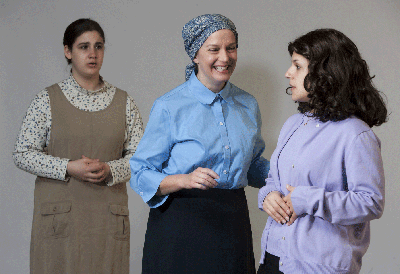Naomi Ragen’s play about domestic abuse in Jerusalem’s ultra-Orthodox precincts deserves a local audience
By DORIS RUBENSTEIN
Women in the Twin Cities Jewish community (and, men, you’ll have to take my word for this) are familiar with the signs in the restrooms of synagogues and other Jewish community buildings: “Judaism has many rich traditions… Domestic abuse is not one of them.” A telephone hotline number follows.
Another hotline to alert the Jewish community to this taboo is the current offering at the Minnesota Jewish Theatre Company, Women’s Minyan, by Israeli playwright Naomi Ragen, and directed here by Carolyn Levy.
The play starts with the entrance of a group of 10 women dressed in a variety of styles and colors, expressing their individual personalities. Over the droning voice of an unnamed rabbi (provided by Rabbi Yosi Gordon) explaining the Talmudic laws of female modesty, we see them change into the drab garb that transforms them into the Haredi (ultra-Orthodox) women of the story. You can see the life drain out of their bodies and faces as they reluctantly fold these unique expressions of their lives into small bundles and hide them away into black boxes (that are economically transformed into various parts of the set by scenic designer Mike Allen).
These pious residents of Jerusalem’s Mea Shearim district live highly circumscribed lives. Most of them accept their portion in life and some even revel in it. Their life experience is such that they know little of what happens outside of their ghetto; and they have little time or energy, between earning a living for their scholarly husbands and caring for herds of children, to learn about it. Were it not for the essential telephone, there is not much of modern life evident to show that they live in our times.
And that’s true, also, of domestic abuse. This is a crime that knows no time, religion or social class.
 Kira Pontiff (left), Kirby Bennett (center) and Roneet Aliza Rahamim star in Minnesota Jewish Theatre Company’s production of Women’s Minyan. (Photo: Sarah Whiting)
Kira Pontiff (left), Kirby Bennett (center) and Roneet Aliza Rahamim star in Minnesota Jewish Theatre Company’s production of Women’s Minyan. (Photo: Sarah Whiting)
Women’s Minyan, based on a true story, deals with the tragedy of Chana Kashman Sheinhoff (Kirby Bennett), a Mea Shearim rebbitzin who lives the lie of having the perfect marriage (12 children, kine hora!), while hiding the physical and psychological horror of abuse by her husband. The cards are stacked against her in Mea Shearim and its rabbinic court system.
To save her life, she abandons her family and uses the Israeli court and criminal justice systems to restore her children to her. This course of action is a considered a tremendous betrayal and shanda by the entire Haredi community, including her family: her caring mother-in-law (Miriam Monash) and stuttering sister-in-law (Bethany Ford); her witch of a mother (Meri Golden) and haughty sister (Delta Giordano); and her two eldest daughters (Kira Pontiff and Roneet Aliza Rahamim). Adding some comic relief are her Mutt and Jeff-like friends (played with relish by Jamie Kleiman and Natasha Oreskovich). Rounding out the cast and the minyan is her only true friend and confidante (Julie Ann Nevill), who, as a Sephardic Jew, engenders suspicion from the Haredim.
The play’s first act is a long one, and I noticed not a few in the audience twitching in their seats. They were anxious to get to the second act where the truth behind this betrayal is revealed to all in the minyan. It was worth the wait: the bombshell that explodes the lie the women have embraced for two years shatters their world and their beliefs. It is not enough, unfortunately, to make for a happy ending for Chana. We learn in the program notes that she remains an outcast to her community and her children.
While domestic abuse is — also unfortunately — universal, Women’s Minyan is a very Jewish play. Hebrew and Yiddish words abound and various rituals are referenced or performed. Non-Jews in the audience (including a friend of mine) may find these mysterious or confusing, but not enough to seriously disturb their understanding and appreciation of the real message it delivers.
MJTC is offering a variety of workshops during the play’s final days to explain and expand on the issues it presents for those who wish to learn more. That may require a second visit to the Hillcrest Playhouse, a worthwhile activity. Women’s Minyan ran for six years at Habima in Tel Aviv. It deserves a good run here, and perhaps a revival in the future.
***
Women’s Minyan runs through May 9 at Hillcrest Center, 1978 Ford Pkwy., St. Paul. For tickets, call 651-647-4315 or e-mail: info@mnjewishtheatre.org. For information, go to: mnjewishtheatre.org.









 Kira Pontiff (left), Kirby Bennett (center) and Roneet Aliza Rahamim star in Minnesota Jewish Theatre Company’s production of Women’s Minyan. (Photo: Sarah Whiting)
Kira Pontiff (left), Kirby Bennett (center) and Roneet Aliza Rahamim star in Minnesota Jewish Theatre Company’s production of Women’s Minyan. (Photo: Sarah Whiting)









